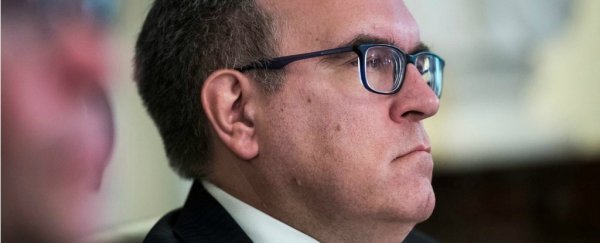Andrew Wheeler's lobbying ties have come under increasing scrutiny now that he has taken the helm of the Environmental Protection Agency, even though federal rules offer him wide latitude to meet with groups that retained him before April 2016.
Under the Trump administration's ethics pledge, a political appointee cannot meet with anyone to whom he or she has provided services during the two years before joining the federal government — except under specific circumstances.
That two-year window defines which companies and groups count as a "former client" in the eyes of federal ethics officials and which do not.
Since joining the EPA on April 20, Wheeler has met with multiple organizations and businesses that retained him in his capacity as a principal at Faegre Baker Daniels.
The list includes biodiesel producer Darling Ingredients; agriculture giant Archer Daniels Midland and the South Coast Air Quality Management District, all of which ended their financial relationship with Wheeler's firm before April 2016.
"We're very clear about what the definition of former client is," Justina Fugh, senior counsel at EPA's ethics office, said in an interview Friday. "You're either in it, or you're not. It's a toggle switch."
In Wheeler's May 24 letter outlining his ethics obligations regarding former clients, he identified eight from which he needed to recuse himself when it came to EPA matters.
Those included the nation's largest privately owned coal company, Murray Energy; Sargento Food Co.; Underwriters Laboratories; Energy Fuels Resources; Growth Energy; International Paper; Martin Farms, and Xcel Energy.
Wheeler did attend three events with groups connected to International Paper, E&E News reported Thursday, including a June 6 meeting with the Business Roundtable's Energy & Environment Committee, a June 28 session with the American Forest and Paper Association's board of directors and a "stakeholder" meeting with AFPA and other organization.
But the ethics pledge allows for federal officials to meet with a former client if the session is on a subject that is "a matter of general applicability" and is "open to all interested parties."
Both the Trump and Obama administrations have defined an "open" session as one in which at least five people are present and the attendees represent a diversity of perspectives.
Melinda Pierce, legislative director for the environmental advocacy group Sierra Club, said in a statement that even if Wheeler was complying with the law, the recent meetings show that it took him "less than a month as acting EPA administrator to prove he can't and won't let go of his corporate polluter past."
Wheeler has estimated he represented roughly 20 clients with business before the federal government during his time in private practice: That portfolio included the Nuclear Energy Institute, the Domestic Fuels Solutions Group, Whirlpool Corp. and chemical manufacturer Celanese Corp.
Under his recusal arrangement, his senior adviser, Michael Molina, screens his schedule for any potential conflicts of interest and consults with the ethics office should something arise.
"We're trusting that they're following the terms of recusal," Fugh said. "And I believe that they are."
She noted that Wheeler's staff checked with EPA ethics lawyers when he was invited to speak in September to the National Energy Resources Organization (NERO), a nonpartisan, nonprofit group made up largely of energy industry players. Wheeler chaired the group's executive board from 2014 to 2015, according to Internal Revenue Service filings, and served as chairman emeritus from 2015 to 2016.
Fugh said her office told Wheeler's aides to decline the invitation, because he had been affiliated with the group, even though he did not have a financial relationship with it.
Lukas Ross, a senior policy analyst at the advocacy group Friends of the Earth, said in an interview Friday that Wheeler's affiliation with NERO raises questions because of its membership and because its executive director, Carole Goeas, is a Republican fundraiser.
"Ultimately, this is about the fossil fuel industry and a way to inject it into our politics in a way that's dangerous for the climate," Ross said.
NERO Chairman Laura Marshall Schepis rejected the idea that her group was affiliated with a specific viewpoint or party.
"We have Republicans and Democrats, we have traditional fuels and renewables," Schepis said, adding that NERO's events are open to the public.
Schepis added that she respects the decision Wheeler and his colleagues made to decline the invitation. "We hope to welcome him next spring or summer as a speaker," she said.
Several groups that had worked with Wheeler's former firm said their recent conversations with him were unrelated to any past work he had done at FBD.
Archer Daniels Midland spokeswoman Jackie Anderson said in an email that company officials attended a meeting with Wheeler on the renewable fuels standard on May 24, which was "the first time we discussed EPA-related issues with Mr. Wheeler. Our previous work with Mr. Wheeler was several years ago around un-related food-issues."
Sam Atwood, a spokesman for the South Coast Air Quality Management District, said that while the district did retain FBD from 2010 to 2012, "I cannot find any indication that Andrew Wheeler was a point of contact."
The district's executive officer, Wayne Nastri, met with Wheeler on June 22 to discuss its push for stricter nitrogen oxide emissions limits for heavy-duty trucks, Atwood added.
2018 © The Washington Post
This article was originally published by The Washington Post.
